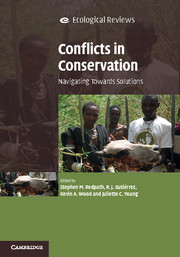Book contents
- Frontmatter
- Dedication
- Contents
- List of contributors
- Foreword by Georgina Mace
- Acknowledgements
- Part I Introduction to conservation and conflict
- PART II Contrasting disciplinary approaches to the study of conflict in conservation
- 3 The value of ecological information in conservation conflict
- 4 Environmental history and conservation conflicts
- 5 The political ecology of conservation conflicts
- 6 Understanding conservation conflicts: an economic perspective
- 7 Anthropological approaches to conservation conflicts
- 8 Law and conservation conflicts
- 9 The relevance of psychology to conservation conflicts
- 10 Conservation conflicts: ethical issues
- 11 A view from sociology: environmental movement mobilisation over old-growth temperate rainforests in British Columbia
- 12 Peace research and conservation conflicts
- 13 Linking conflict and global biodiversity conservation policies
- Part III Approaches to managing conflicts
- Index
- Plate Section
- References
10 - Conservation conflicts: ethical issues
from PART II - Contrasting disciplinary approaches to the study of conflict in conservation
Published online by Cambridge University Press: 05 May 2015
- Frontmatter
- Dedication
- Contents
- List of contributors
- Foreword by Georgina Mace
- Acknowledgements
- Part I Introduction to conservation and conflict
- PART II Contrasting disciplinary approaches to the study of conflict in conservation
- 3 The value of ecological information in conservation conflict
- 4 Environmental history and conservation conflicts
- 5 The political ecology of conservation conflicts
- 6 Understanding conservation conflicts: an economic perspective
- 7 Anthropological approaches to conservation conflicts
- 8 Law and conservation conflicts
- 9 The relevance of psychology to conservation conflicts
- 10 Conservation conflicts: ethical issues
- 11 A view from sociology: environmental movement mobilisation over old-growth temperate rainforests in British Columbia
- 12 Peace research and conservation conflicts
- 13 Linking conflict and global biodiversity conservation policies
- Part III Approaches to managing conflicts
- Index
- Plate Section
- References
Summary
Ethics concerns the nature and justification of moral values and their application to decisions about how to act. How should we act? What kind of life should we live? What are the elements of a ‘good’ life? Moral values cover various norms of behaviour, such as telling the truth, keeping promises, not causing harm, acting justly, respecting rights and acting for others. These moral norms generally are accepted at least partly because their observance contributes to the realisation of well-being. So we also need, at least, an account of what human well-being consists of – things like pleasure, happiness, health, knowledge, love, relationships, and appreciation of nature. Different thinkers have different views about what the norms are and what the ‘goods’ are, and how to interpret and justify them. Nevertheless, the ethical point of view is generally contrasted with the self-interested point of view, because it is concerned with what is good, just and right from the point of view of everyone affected by our actions. Therefore, here I present my personal reflections as a philosopher, following 30 years of thinking about environmental issues.
One key issue in environmental ethics that arises in conservation conflicts is this: for whom is conservation being done – just current human beings, or other groups such as future human beings or non-human animals? Another issue is what is the nature of well-being of human beings? It makes a big difference whether what is important to human well-being is having (more) wealth and possessions or having quality in human relationships, which includes our relationship with nature. Being clearer about these questions sharpens our understanding of environmental conflicts by clarifying the underlying values of each position, the nature of differences (deep or superficial) and whether there is a reasonable possibility of compromise.
Practical and theoretical conflicts
Conflicts over the environment fall into two broad categories – practical conflicts about what ought to be done, and theoretical conflicts about the reasons why something ought to be done.
- Type
- Chapter
- Information
- Conflicts in ConservationNavigating Towards Solutions, pp. 137 - 151Publisher: Cambridge University PressPrint publication year: 2015
References
- 1
- Cited by

